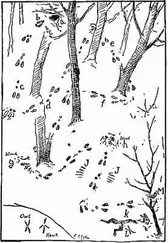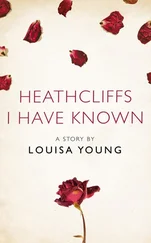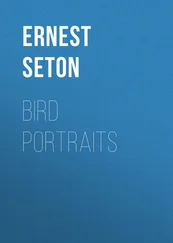Ernest Seton - Wild Animals I Have Known
Здесь есть возможность читать онлайн «Ernest Seton - Wild Animals I Have Known» весь текст электронной книги совершенно бесплатно (целиком полную версию без сокращений). В некоторых случаях можно слушать аудио, скачать через торрент в формате fb2 и присутствует краткое содержание. Год выпуска: 2001, Жанр: Природа и животные, на английском языке. Описание произведения, (предисловие) а так же отзывы посетителей доступны на портале библиотеки ЛибКат.
- Название:Wild Animals I Have Known
- Автор:
- Жанр:
- Год:2001
- ISBN:нет данных
- Рейтинг книги:5 / 5. Голосов: 1
-
Избранное:Добавить в избранное
- Отзывы:
-
Ваша оценка:
- 100
- 1
- 2
- 3
- 4
- 5
Wild Animals I Have Known: краткое содержание, описание и аннотация
Предлагаем к чтению аннотацию, описание, краткое содержание или предисловие (зависит от того, что написал сам автор книги «Wild Animals I Have Known»). Если вы не нашли необходимую информацию о книге — напишите в комментариях, мы постараемся отыскать её.
Wild Animals I Have Known — читать онлайн бесплатно полную книгу (весь текст) целиком
Ниже представлен текст книги, разбитый по страницам. Система сохранения места последней прочитанной страницы, позволяет с удобством читать онлайн бесплатно книгу «Wild Animals I Have Known», без необходимости каждый раз заново искать на чём Вы остановились. Поставьте закладку, и сможете в любой момент перейти на страницу, на которой закончили чтение.
Интервал:
Закладка:
But there was no fox waiting to tear her with ravenous jaws. Rag had escaped the first onset of the foe, and as soon as he regained his wits he came running back to change-off and so help his mother. He met the old fox going round the pond to meet Molly and led him far and away, then dismissed him with a barbed-wire gash on his head, and came to the bank and sought about and trailed and thumped, but all his searching was in vain; he could not find his little mother. He never saw her again, and he never knew whither she went, for she slept her never-waking sleep in the ice-arms of her friend the Water that tells no tales.
Poor little Molly Cottontail! She was a true heroine, yet only one of unnumbered millions that without a thought of heroism have lived and done their best in their little world, and died. She fought a good fight in the battle of life. She was good stuff; the stuff that never dies. For flesh of her flesh and brain of her brain was Rag. She lives in him, and through him transmits a finer fibre to her race.
And Rag still lives in the Swamp. Old Olifant died that winter, and the unthrifty sons ceased to clear the Swamp or mend the wire fences. Within a single year it was a wilder place than ever; fresh trees and brambles grew, and falling wires made many Cottontail castles and last retreats that dogs and foxes dared not storm. And there to this day lives Rag. He is a big strong buck now and fears no rivals. He has a large family of his own, and a pretty brown wife that he got I know not where. There, no doubt, he and his children's children will flourish for many years to come, and there you may see them any sunny evening if you have learnt their signal S code, and, choosing a good spot on the ground, know just how and when to thump it.
BINGO, The Story of My Dog
"Ye Franckelyn's dogge leaped over a style,
And yey yclept him lyttel Bingo,
B-I-N-G-O,
And yey yclept him lyttel Bingo.
Ye Franchelyn's wyfe brewed nutte-brown ayle,
And he yclept ytte rare-goode Stingo,
S-T-I-N-G-O,
And he yclept ytte rare goode Stingo.
Now ys not this a prettye rhyme,
I thynke ytte ys bye Jingo,
J-I-N-G-O,
I thynke ytte ys bye Jingo."
I
IT WAS EARLY in November, 1882, and the Manitoba winter had just set in. I was tilting back in my chair for a few lazy moments after breakfast, idly alternating my gaze from the one window-pane of our shanty, through which was framed a bit of the prairie and the end of our cowshed, to the old rhyme of the 'Franckelyn's dogge' pinned on the logs near by. But the dreamy mixture of rhyme and view was quickly dispelled by the sight of a large gray animal dashing across the prairie into the cowshed, with a smaller black and white animal in hot pursuit.
"A wolf," I exclaimed, and seizing a rifle dashed out to help the dog. But before I could get there they had left the stable, and after a short run over the snow the wolf again turned at bay, and the dog, our neighbor's collie, circled about watching his chance to snap.
I fired a couple of long shots, which had the effect only of setting them off again over the prairie. After another run this matchless dog closed and seized the wolf by the haunch, but again retreated to avoid the fierce return chop. Then there was another stand at bay, and again a race over the snow. Every few hundred yards this scene was repeated, the dog managing so that each fresh rush should be toward the settlement, while the wolf vainly tried to break back toward the dark belt of trees in the east. At last after a mile of this fighting and running I overtook them, and the dog, seeing that he now had good backing, closed in for the finish.
After a few seconds the whirl of struggling animals resolved itself into a wolf, on his back, with a bleeding collie gripping his throat, and it was now easy for me to step up and end the fight by putting a ball through the wolf's head.
Then, when this dog of marvellous wind saw that his foe was dead, he gave him no second glance, but set out at a lope for a farm four miles across the snow where he had left his master when first the wolf was started. He was a wonderful dog, and even if I had not come he undoubtedly would have killed the wolf alone, as I learned he had already done with others of the kind, in spite of the fact that the wolf, though of the smaller or prairie race, was much large than himself. I was filled with admiration for the dog's prowess and at once sought to buy him at any price. The scornful reply of his owner was, "Why don't you try to buy one of the children?"
Since Frank was not in the market I was obliged to content myself with the next best thing, one of his alleged progeny. That is, a son of his wife. This probable offspring of an illustrious sire was a roly-poly ball of black fur that looked more like a long-tailed bearcub than a puppy. But he had some tan markings like those on Frank's coat, that were, I hoped, guarantees of future greatness, and also a very characteristic ring of white that he always wore on his muzzle.
Having got possession of his person, the next thing was to find him a name. Surely this puzzle was already solved. The rhyme of the 'Franckelyn's dogge' was in-built with the foundation of our acquaintance, so with adequate pomp we yclept him little Bingo.'
II
The rest of that winter Bingo spent in our shanty, living the life of a blubbery, fat, well-meaning, ill-doing puppy; gorging himself with food and growing bigger and clumsier each day. Even sad experience failed to teach him that he must keep his nose out of the rat trap. His most friendly overtures to the cat were wholly misunderstood and resulted only in an armed neutrality that varied by occasional reigns of terror, continued to the end; which came when Bingo, who early showed a mind of his own, got a notion for sleeping at the barn and avoiding the shanty altogether.
When the spring came I set about his serious education. After much pains on my behalf and many pains on his, he learned to go at the word in quest of our old yellow cow, that pastured at will on the unfenced prairie.
Once he had learned his business, he became very fond of it and nothing pleased him more than an order to go and fetch the cow. Away he would dash, barking with pleasure and leaping high in the air that he might better scan the plain for his victim. In a short time he would return driving her at full gallop before him, and gave her no peace until, puffing and blowing, she was safely driven into the farthest corner of her stable.
Less energy on his part would have been more satisfactory, but we bore with him until he grew so fond of this semi-daily hunt that he began to bring 'old Dunne' without being told. And at length not once or twice but a dozen times a day this energetic cowherd would sally forth on his own responsibility and drive the cow home to the stable.
At last things came to such a pass that whenever he felt like taking a little exercise, or had a few minutes of spare time, or even happened to think of it, Bingo would sally forth at racing speed over the plain and a few minutes later return, driving the unhappy yellow cow at full gallop before him.
At first this did not seem very bad, as it kept the cow from straying too far; but soon it was seen that it hindered her feeding. She became thin and gave less milk; it seemed to weigh on her mind too, as she was always watching nervously for that hateful dog, and in the mornings would hang around the stable as though afraid to venture off and subject herself at once to an onset.
This was going too far. All attempts to make Bingo more moderate in his pleasure were failures, so he was compelled to give it up altogether. After this, though he dared not bring her home, he continued to show his interest by lying at her stable door while she was being milked.
Читать дальшеИнтервал:
Закладка:
Похожие книги на «Wild Animals I Have Known»
Представляем Вашему вниманию похожие книги на «Wild Animals I Have Known» списком для выбора. Мы отобрали схожую по названию и смыслу литературу в надежде предоставить читателям больше вариантов отыскать новые, интересные, ещё непрочитанные произведения.
Обсуждение, отзывы о книге «Wild Animals I Have Known» и просто собственные мнения читателей. Оставьте ваши комментарии, напишите, что Вы думаете о произведении, его смысле или главных героях. Укажите что конкретно понравилось, а что нет, и почему Вы так считаете.





